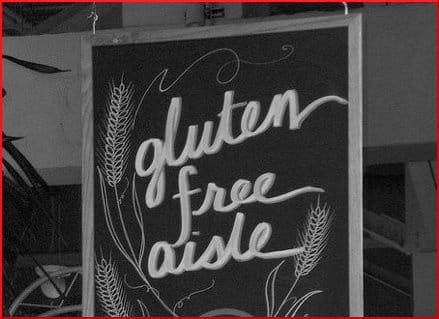
In the science of forensics, transfer theory holds that a criminal will always leave trace evidence at the crime scene. A person with celiac disease has to be as suspicious and hyper-vigilant as a detective dusting for fingerprints. If the grocery store has bulk bins, the scoop you use to measure out some safe food may have previously been used for a gluten-containing food, and you might get sick. People who don’t have CD but wish to avoid gluten for other reasons are constantly surprised to find the stuff popping up everywhere.
Yesterday, Childhood Obesity News mentioned the input received from the Weigh2Rock kids, who confide their problems and secrets to Dr. Pretlow’s website. Where do they stand on gluten? Well, aside from treats featuring wheat flour, they also tend to get hooked on fried foods, cheese, corn chips, popcorn, sour cream, nuts, burgers, potato chips and chocolate — none of which seem, at first glance, as if they would be guilty of containing gluten. Many sources were consulted to take the measure of just how innocent these particular items actually are.
Fried foods — Any fried item that has been marinated, breaded or battered has gluten. Flavorings have it. “Fillers” and anti-clumping agents have it. In most restaurants, all the fried entrees are cooked in the same fryers. The intense heat of the oil doesn’t kill gluten but transfers it to foods that are sold as gluten-free.
Cheese — Cheese is dairy, right? Why would it contain gluten? Yet it can. If it’s processed or “beer-washed,” the gluten avoider will shun it. If it’s blue cheese or Roquefort, it might have been treated with bacteria grown from rye, and bingo — you’ve got gluten. Now imagine a fancy supermarket, the kind that buys gigantic wheels of cheese. Every cut and repackaging is an opportunity for cross-contamination. Plus, flour from the store’s bakery floats in the air and lands on things. Incredibly, the ingredient lists on yogurt tubs must also be carefully read.
Corn chips — Again, careful scrutiny of the ingredients is a must. Tortilla chips can be manufactured with a variety of flours, making them a risky food for gluten-intolerant people.
Popcorn — The movie-theater kind seems to be okay, gluten-wise. Microwave popcorn and the pre-popped kind in decorated tins are not.
Sour Cream — This is amazing, but nonfat, light and full-fat sour cream are all perfectly capable of harboring gluten.
Nuts — Yep, flavored nuts, dry-roasted nuts, coated nuts, any of them could contain gluten. Even the ones that start out gluten-free can be cross-contaminated in retail store bins.
Burgers — When kids are talking about burgers, they mean buns too, which of course are bread and therefore crammed with gluten. Okay, so just order the burger without a bun. Not so fast! Even some hamburger meat is enhanced with “filler,” or the kitchen might stretch it by adding bread crumbs. It might be cross-contaminated from anything in the kitchen, and did the worker change gloves before handling your food?
Potato chips — These crunchy treats are hugely addictive, and some brands contain gluten ingredients like seasonings, while others are subject to gluten cross-contamination in production.
Chocolate — Here’s the bad news, from Jane Anderson:
Some chocolate candy products feature gluten ingredients — either in the form of wheat (most frequently in chocolate-cookie confections) or in the form of barley malt (a popular sweetener frequently used in candy). Other chocolate candies contain no gluten ingredients, but they are subject to gluten cross-contamination because they’re made on the same manufacturing equipment or in the same facilities as those gluten-containing items.
The list of unsafe foods and additives is literally hundreds of items long: imitation crab meat, licorice candy, soy sauce, malt vinegar — it just goes on and on. This gets into another realm of addiction, but beer, of course, contains gluten.
Dr. William Davis says that whole wheat bread increases blood sugar, and eating a couple of slices of it is pretty much the equivalent of eating a candy bar or drinking a can of soda pop. But the news gets even worse. He cautions patients not to go near processed foods labeled gluten-free that substitute various forms of starch. Why?
The few foods that increase blood sugar higher than even wheat include … rice starch, cornstarch, tapioca starch, and potato starch — the most common ingredients used in gluten-free foods…. [M]any celiac patients who forego wheat and resort to gluten-free foods become fat and diabetic.
Your responses and feedback are welcome!
Source: “Is chocolate gluten-free or does chocolate contain gluten?” About.com, 02/29/12
Source: “Summary: Wheat Belly by William Davis, MD,” TheHealingProject.us, 09/22/12
Image by Whatsername?

 FAQs and Media Requests:
FAQs and Media Requests: 











